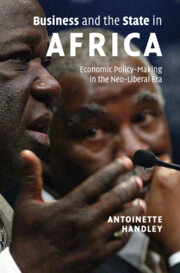Book contents
- Frontmatter
- Contents
- List of figures
- Acknowledgments
- List of abbreviations
- Introduction: the African business class and development
- Part one Institutionalizing constructive contestation
- Part two Business and the neo-patrimonial state
- 4 The emergence of neo-patrimonial business in Ghana, 1850–1989
- 5 State-dominant reform: Ghana in the 1990s and 2000s
- 6 Business and government in Zambia: too close for comfort
- Conclusion: the business of economic policy-making, comparatively speaking
- Bibliography
- Index
6 - Business and government in Zambia: too close for comfort
Published online by Cambridge University Press: 22 September 2009
- Frontmatter
- Contents
- List of figures
- Acknowledgments
- List of abbreviations
- Introduction: the African business class and development
- Part one Institutionalizing constructive contestation
- Part two Business and the neo-patrimonial state
- 4 The emergence of neo-patrimonial business in Ghana, 1850–1989
- 5 State-dominant reform: Ghana in the 1990s and 2000s
- 6 Business and government in Zambia: too close for comfort
- Conclusion: the business of economic policy-making, comparatively speaking
- Bibliography
- Index
Summary
Big business [in Zambia] is quasi-parastatal. You're supplying government and lending money to government. A huge proportion of the private sector milks the government for a living.
After decades of economic decline in Zambia, the transition to multiparty democracy in 1991 presented Zambians with an opportunity to redraw their political and economic landscape. Despite an auspicious start to the reform process, however, by the end of the decade there had been no fundamental revision of the role of business in economic policy-making. The puzzle that this chapter seeks to solve concerns this surprisingly low level of input by business into the policy-making of a government that had embraced, apparently fervently, an extensive role for the private sector in the economy. In particular, why was it that, despite a high level of influence in the formation of the Movement for Multi-Party Democracy (the MMD) as a party and in the early days of the MMD as a government, the business sector as a corporate entity rapidly lost this level of influence in that decade?
The proximate answer is twofold. First, despite the apparent political revolution represented by the return to multiparty politics and the conversion to neo-liberal economics, government by the MMD rapidly reverted to an older, neo-patrimonial mode of governance in which the access of business to the state was personalized. Second, the voice of organized business weakened over the course of the decade.
- Type
- Chapter
- Information
- Business and the State in AfricaEconomic Policy-Making in the Neo-Liberal Era, pp. 207 - 241Publisher: Cambridge University PressPrint publication year: 2008
- 1
- Cited by

